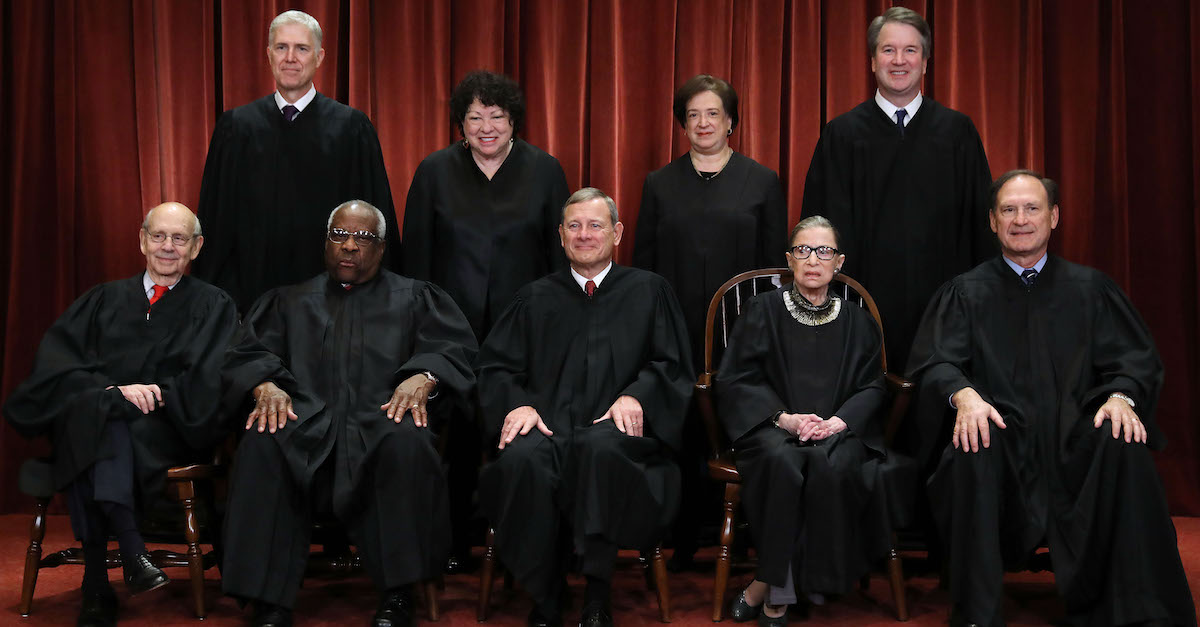
SCOTUS decided Rehaif v. United States Friday — a case about how federal gun laws should be applied to immigrants unlawfully on American soil. The Court held 7 to 2 in favor of Hamid Rehaif, an immigrant from the United Arab Emirates who overstayed a student visa and was caught illegally possessing a handgun. There was some harsh disagreement among the justices, but not over the topics you might expect; neither immigration nor gun control was discussed at any length. While we’re on the topic of the unexpected, the dissenters who would have construed the gun laws in a manner to make them harsher were two staunch conservatives.
If we’re breaking things down along political lines, liberals generally want more (and stricter) laws outlawing more guns, while conservatives want less (and narrower) laws outlawing less guns. But things apparently change considerably when the question changes from “what laws are a good idea,” to, “should laws be interpreted in a way that makes it easier or harder to prosecute people for gun crimes?”
Specifically, here is what was at issue. 18 U. S. C. §922(g) makes it unlawful for a number of categories of people to possess firearms. Those categories include, among other things, people who have been convicted of certain crimes, fugitives from justice, adjudicated drug addicts and mental defectives, and aliens who are unlawfully in the United States. Another portion of the statute, §924(a)(2), adds that anyone who “knowingly violates” §922(g)shall be fined or imprisoned for up to ten years. The Supreme Court dealt with the question of exactly what “knowingly” means. Would a person need to know they have a gun and know that they fall into one of those categories? Or is it enough that they know they possess a gun? The answer to that question of what seems like semantics was of the utmost importance to Hamid Rehaif.
Rehaif entered the United States on a nonimmigrant student visa to attend college. Rehaif attended college, but flunked out and was dismissed by the university. Later, he visited a firing range for target practice. He was later arrested, charged, and convicted with violating of §922(g) and §924(a)(2), and was sentenced to eighteen months in prison.
Writing for the Court’s 7-2 majority, Justice Stephen Breyer delivered a lengthy analysis of the language of the two statutes. The decision sounded remarkably like something out of a 1L Criminal Law syllabus; the mens rea modifier (here, “knowingly”) generally applies to all material terms of the statute. Breyer discussed “scienter” (legalese for “knowledge”) and presumptions, as well as maxims of statutory construction and grammatical standards. All those things weighed in favor of the statute’s requiring that a person know that he falls into a prohibited class in order to be guilty of the corresponding crime. Breyer pointed out that the fact that this particular analysis relates to weapons possession is largely irrelevant, because, “Assuming compliance with ordinary licensing requirements, the possession of a gun can be entirely innocent.” The difference between an innocent mistake and a punishable crime is the actor’s knowledge– and if Congress meant to eliminate that difference, it would have overly done so via statute.
The majority’s decision is Rehaif is neither surprising nor groundbreaking; what’s noteworthy is that even the court’s left-leaning justices had no intention of abandon longstanding principles of statutory interpretation in an effort to criminalize more gun possession. Rather, the Court (all but two of its most conservative members) opted to require a higher degree of proof of criminal mindset from prosecutors.
By contrast, Justices Samuel Alito and Clarence Thomas would have relaxed the prosecution’s requirements if it meant an easier conviction for Rehaif. The two dissenters were not pleased with the majority’s take on §922(g). Alito objected:
[§922(g)] probably does more to combat gun violence than any other federal law. It prohibits the possession of firearms by, among others, convicted felons, mentally ill persons found by a court to present a danger to the community, stalkers, harassers, perpetrators of domestic violence, and illegal aliens.
Today’s decision will make it significantly harder to convict persons falling into some of these categories, and the decision will create a mountain of problems with respect to the thousands of prisoners currently serving terms for §922(g) convictions.
That wasn’t all, either. Alito accused the majority of relying on a “bowdlerized” version (one missing important elements) of the facts. Rehaif wasn’t the victim of a “heartless prosecution,” but was rather, a college flunkee who spent inordinate time at a firing range when not holed up in an airport hotel. Alito slammed Rehaif for succeeding at performing a “sleight of hand” with his winning argument – convincing the court to interpret the statutes in an illogical and unnatural way.
The justice ended his dissent with some stern omens:
Although the majority presents its decision as modest, its practical effects will be far reaching and cannot be ignored. Tens of thousands of prisoners are currently serving sentences for violating 18 U. S. C. §922(g).
It is true that many pleaded guilty, and for most direct review is over. Nevertheless, every one of those prisoners will be able to seek relief by one route or another.
Conspicuously absent from either the majority opinion or the dissent was any real mention of either immigration or of gun control. Both groups of justices presented antiseptic analyses of statutory interpretation, general foundations of criminal jurisprudence, and conventions of language – coalescing to almost purposefully ignore the case’s underpinnings. Perhaps SCOTUS’ decision is better for that absence, perhaps not.
[image via Chip Somodevilla/Getty Images]
Have a tip we should know? [email protected]